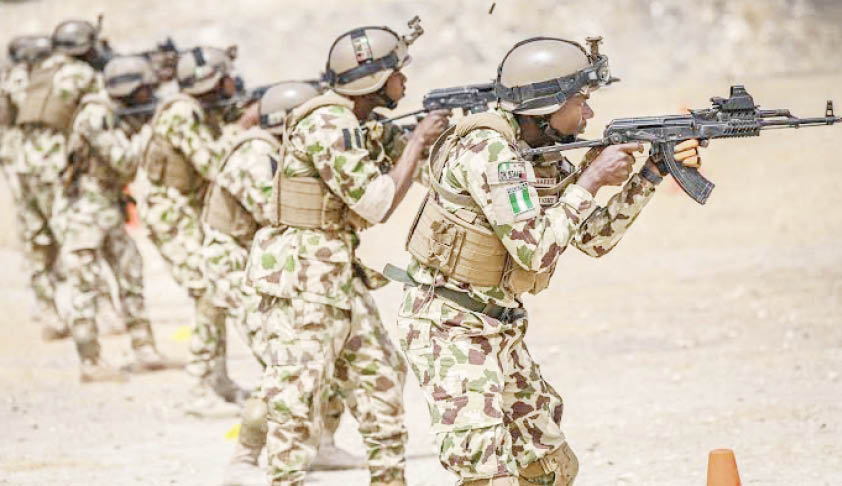Why Tarok nation has fearless soldiers, generals
Langtang in Plateau State is famous for producing senior military officers. Daily Trust reports on why the Tarok people of the area are fond of military service. The Tarok tribe in Langtang North and South local government areas of Plateau State is said to be a tribe of warriors and known as the ethnic group […]

Langtang in Plateau State is famous for producing senior military officers. Daily Trust reports on why the Tarok people of the area are fond of military service.
The Tarok tribe in Langtang North and South local government areas of Plateau State is said to be a tribe of warriors and known as the ethnic group with the highest number of military personnel in the North Central.
Many believe that the two local government areas stand out as the only communities with the highest number of retired military, officers, in the country. There are more Army Generals in the town than in any other single ethnic group in the entire North Central.
Almost every household/family (nuclear or extended) in Langtang has a military personnel; it could be a senior or junior officer/other ranks.
Their momentous period and explosive awareness in the military dates back to the regime of President Ibrahim Babangida, when they were referred to as the ‘Langtang Mafia’. Their military personnel, particularly the senior officers, held various positions during the military junta, while others announced military coups. By and large, the Langtang military personnel are dreaded.
A native of Langtang, Gwamkat, said their fearless and warrior nature endears them to rugged professions like the military, and that they always wish that every household would produce a military personnel.
Gwamkat said the Tarok people are determined to the extent that should the military be left for them to control, they can fit in and do it perfectly.
She hailed the present military personnel, saying they are trying their best in tackling the insecurity and that more can still be done this year.
Another Langtang native, Golok Nanmwal, said a typical Langtang family teaches their children about bravery and all they should do to be strong and resilient in life.
And with such mentality, he said, a Tarok child grows up to be strong, fearless, and daring, adding that they have a defensive attitude and that is why they have been in the military for a while now and have been producing great military personnel.
According to him, the Tarok child is being taught from childhood that the world is a tough place and you have to live up to the toughness of the world, and so the children grow up with that mentality. He said if, given the opportunity, the Tarok people can tackle the insecurity in the nation.
Also, a Langtang native, Patience Dombin, said the people have always been striving hard to maintain the feat/historical perspective as the community with the highest number of soldiers and the ‘Home of Generals’ in the country.
She said most of the retired generals actually helped the others to get recruited then, adding that such gesture dwindled, but that the people are struggling to get into the military on their own now.
Sandra Manko Bindip on her own part said her father was a soldier and resigned in 1979, and that her elder brother was also a soldier and resigned this year.
She said they both resigned as Warrant Officers, adding that her family is related to Gen. Joshua Dogonyaro.
Bindip explained that her father encouraged her brothers to join the Nigerian Army because he believed in the military, and also because the military profession exudes the fearlessness and ruggedness that is synonymous with the Tarok man.
She said apart from the fact that the Tarok people have been in the military and still wish to continue assisting their wards to get recruited because of the characteristic bond between the military and the Tarok lifestyle, the military also serves as a source of employment for their people.
Meanwhile, our correspondent reports that the Tarok people have a strong cultural lifestyle. They remain arguably the tribe in North Central to have strongly upheld their cultural values and attendant ancestral manifestations.
Among the great generals from Langtang are Late General Domkat Bali, Late Joseph Garba, Jeremiah Useni, Joshua Dogonyaro, Late John Shagaya, Jonathan Temlong, Musa Gambo, Yakubu Rimdam, and Ishaku Pennap. Others are Air Marshal Jonah D. Wuyep, Air Commodore Bernard Banfa and General Muhammad A. Najib.
Domkat Bali was the Chairman Joint Chiefs of Staff and Minister of Defence and was the Ponzhi Tarok before he died recently. Yakubu Rimdan served in the Guards Brigade Dodan Barracks, Ikoyi Lagos, during General Yakubu Gowon’s regime. Jon Temlong was a military strategist who served in many foreign peacekeeping missions. Jeremiah Useni was the Minister of the Federal Capital Territory and has held several positions. Late John Shagaya also held several positions in the military before retiring, and that applies to the others.
Last week, the fearless strength and cultural dynasty was almost exercised when Domkat Bali, the Ponzhi Tarok, passed on and they alleged that the military had taken over the burial without allowing them to perform their traditional burial rites for their traditional ruler.
But there were several interventions and the matter was settled amicably, thereby allowing a hitch-free burial, devoid of violence.
By and large, whenever ‘Langtang’ is mentioned, the first thing that comes to mind (of those who know them properly) is a tough, fearless and strong people, hence their military exploits and doggedness.
Langtang is located in the southern part of Plateau State and connected to Tunkus, Shendam, Kanam and Wase through access roads.
